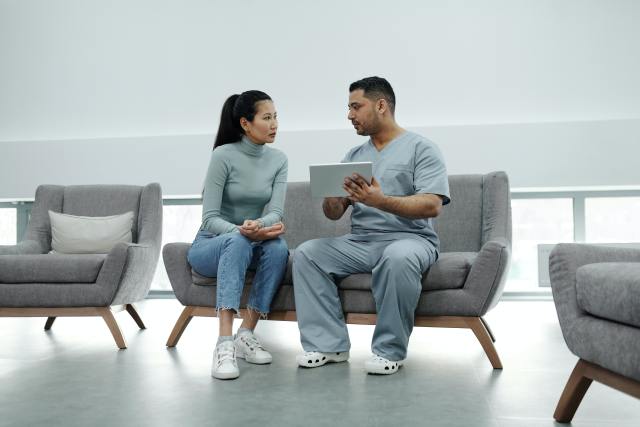One fateful day a few years ago, I learned I would have to visit the gynecologist for the first time ever. Honestly, I was nothing short of horrified. At only 18, barely a freshman, I had absolutely no clue what to expect, since none of my friends had ever been before — or, more likely, we’d just never spoken about it. I had so many questions and so few answers, which made the process much more daunting.
Now that I’m older and wiser, I look back and wish I could tell myself so many things before that first appointment. And as more college students start having their first appointments, it’s becoming increasingly important to shed light on what it’s like to visit the gynecologist for the first time — a topic that, unfortunately, is taboo in today’s society. With all of this lack of information, it’s pretty terrifying to step into that doctor’s office with no idea what you’re getting into.
All of these fears are only heightened if you’re going alone, without any moral support. I was lucky enough to have my mom there with me during my first visit, but I know that a lot of other college students don’t have that luxury. If you don’t have anyone to advise you on what it’s like to visit the gynecologist for the first time, don’t worry — I’ve got you, bestie! Here are nine key things to remember before you go.

- Sex and pregnancy are not the only reasons to go to the gynecologist.
-
Picture this: 18-year-old me walks into the gynecologist’s office to see a bunch of pregnant women staring at me, undoubtedly wondering why the hell I was there. I have no doubt they assumed I was getting an IUD put in or getting checked for an STI, because I’m visibly too young to start getting pap smears. I don’t really blame them, considering those are two common reasons why teenagers visit the gynecologist — especially those as visibly scared as I was. But before this experience, I had no clue how many possible reasons there are as to why a young person may be attending a gynecologist’s office.
The female anatomy is, well, complicated. There are countless issues you never learn about until you face them yourself. In my case, I went to the gynecologist for a hymenectomy, a procedure I’d never heard of before — but it’s fairly common, according to my gynecologist. Plus, many people also to the gynecologist to just check in and get some expert advice about various sex ed topics, such as weighing the many birth control options. It’s normal to wonder, but dangerous to assume; keep your mind open and don’t make any snap judgments about the people around you.
- It’s going to feel uncomfortable and perhaps a bit unnatural.
-
I’m confident in saying that the feeling I had at the gynecologist was unlike any other. Even when the doctor is just looking around to see what’s going on, it still feels absolutely uncomfortable. Just the seating position you’re in is, well, unusual — this is something you might want to mentally prepare for prior to your appointment.
I won’t lie: You may feel the urge to shrivel up into a fetal position. But instead, I recommend you just keep in mind why you’re there, and the importance of what you’re doing. Pat yourself on the back for taking the effort to learn more about your body and stepping outside your comfort zone to improve your health. Push past the odd feelings and, most of all, trust your doctor.
- Don’t feel awkward talking about your own body.
-
I’m an open book — this article should tell you that much. But even in my case, it still felt awkward to sit across from a stranger and tell them aspects of my life I hadn’t even told most of my friends yet.
Will it feel a bit unorthodox to talk about your period or sex life with someone you’ve never met before? Absolutely. But the only way your doctor can truly understand the state of your health is if you just swallow your pride and open up. It’s not like they’re asking you because they just want to hear all of the juicy details about your sex life — try to answer every question they ask with complete honesty. Think of it this way: When the gynecologist asks if you’ve had sex before, for example, it’s the same as when the dentist asks how often you floss — all they’re trying to do is get background information to help you with your health. I guarantee, they will not judge you!
- Although it may feel like it, they’re not being invasive.
-
It did feel weird that a relative stranger was literally looking around inside of me, but my gynecologist made it clear to me that the awkwardness I felt was not reciprocal.
You may find this hard to believe, but gynecologists find the female genitalia fascinating; a vagina is less of a sex object and more of a complex and captivating part of the human body. The only way they will get to the bottom of whatever’s going on down there is if they take a good look. So, sit back, chill out, and remember that these are trained professionals.
- You can ask your gynecologist to tell you exactly what they’re doing as they do it.
-
It should be clear by now that you probably won’t feel comfortable. But knowledge is power, and one major way to ease anxiety is by knowing precisely what’s going on. My gynecologist guided me through the entire procedure from start to finish, even when it was probably obvious and repetitive to her — this made me feel so much better. I lost all of my “what is going on?” feelings, and the awkwardness was replaced with an increased understanding of my body.
So, if your gynecologist isn’t explaining what they’re doing, don’t hesitate to ask them. View it as an educational experience; easing the unknown is a key way to help you feel better.
- It’s okay to be on your period during the appointment.
-
It felt completely weird going to the gynecologist on my period, and I felt stupid that I came to my appointment without asking if it was okay, or even realizing it may be an issue. But I soon learned that it actually doesn’t matter at all.
Think about it: If gynecologists scheduled all appointments to accommodate their availability, the patient’s schedules, and the patient’s cycle, it would be even more difficult to book an appointment than it already is. Not only this, but cancellations would be through the roof. It’s just not possible, nor is it sensical, to pretend periods don’t exist. In fact, sometimes gynecologists actually prefer when patients are on their periods to ensure that the patient is not pregnant. Periods are natural, and far from an inconvenience when it comes to gynecologists — this is something I wish I hadn’t worried about beforehand.
- You don’t have to maintain your vagina or “make it look nice” just for this appointment.
-
News flash: gynecologists know pubic hair exists. They also understand everything there is to know about female genitalia. Waxing or shaving before your appointment will not fool them or make their job easier, nor will it make them think you have a more beautiful vagina just because it’s hairless.
Believe me, your gynecologist has definitely seen worse things than an unshaven vagina. Plus, the entire concept of keeping your vagina bare is pretty much just an arbitrary social norm. If you enjoy maintaining your pubic hair, feel free to do so, but it’s far from necessary.
- Ask questions, even if they seem dumb or obvious.
-
I’ll be the first person to admit I’m pretty uneducated about my own body, so I figured the best way to learn was to ask all the stupid questions that came into my brain. And I’m so glad I didn’t hold back.
If there’s one time to show that your high school sex ed classes failed you, it’s this. When else will you be in a room with a certified vagina and sex expert? You may not get another opportunity to learn about this part of yourself for another while, so may as well not leave with any burning questions.
- Don’t be afraid to talk about your experience with friends and your SO.
-
For the first year or so after my procedure, it was a secret I carried around. I would only tell my closest friends, and only when it felt like the perfect time to spill. I thought it was the very definition of TMI, and even though my gynecologist swore it was common, I was still convinced I was the only one of my friends who’d experienced anything like this. It was only when I actually opened up that I realized how important it is for others to know about my experience. By talking about my procedure, I was able to inform my friends about a new aspect of female anatomy, and lessen the stigma on women’s health. And on top of all that, I realized I’m not alone, and ended up learning about others’ experiences.
But telling a man about my time at the gynecologist felt like a whole new ball game. So, when I got into a relationship, it took me a while to tell my boyfriend about my experience, for fear that he’d freak out and get grossed out by all the gory details. But here’s the thing: if your SO can’t handle you talking about your vagina, they should never gain access to it.
If we refuse to educate other people about our bodies, we fail to grow as a society. If people give you grossed-out looks when you say you went to the gynecologist, that’s their problem, for being immature enough to cringe at something so common, natural, and, well, human.


